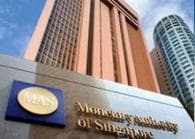
SINGAPORE (Nov 27): Some highly leveraged households in Singapore may be vulnerable if interest rates rise or the economy slows, its central bank said on Thursday, adding that it will take more steps if needed to keep household debt at manageable levels.
"Despite some moderation in the overall level of household indebtedness, the level of debt among highly leveraged households bears close watching," the Monetary Authority of Singapore (MAS) said in its annual Financial Stability Review.
"MAS will continue to monitor lending and borrowing activities, and take further measures where necessary to keep household debt at a manageable level," it added.
A Bank of America Merrill Lynch report said that at June 30, Singapore household debt was equivalent to 75.6 percent of gross domestic product (GDP), while the highest level in Asia was Malaysia, at 86.5 percent.
The MAS said Singapore's household balance sheets remained healthy overall, with total household net wealth now at roughly four times the country's GDP.
In recent years, MAS has taken a series of steps including ones to cool the property market to curb excessive household borrowing.
It said expansion of household debt slowed to 5.6 percent year-on-year in the third quarter, down from a 9.2 percent average over the last five years.
Housing loans accounted for 74 percent of household liabilities as of the end of September, followed by motor vehicle loans, which made up 3.6 percent of such debt, the MAS said.
"The risk of a downturn in the global economy even as the supply of new housing comes onstream and rental markets weaken could put further downward pressure on the property market," it added.
The central bank said it will continue to monitor the property sector and take appropriate steps to maintain a stable and sustainable market.
Private property prices remained at an "elevated" level even though they have moderated, it said.
The MAS said Singapore's banking system remains sound, is resilient to risks stemming from the property market and holds a healthy buffer against falls in property prices.